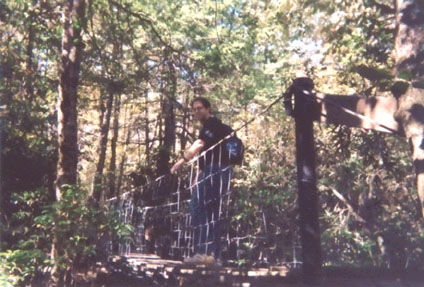Looking Backward and Looking Forward
By Greg Wright, Stephen's Father, February 8, 2006

Stephen's Dad looking backward on Stephen's last camping trip.

As of February 8, 2006 it will have been five years since my son died. Just like a person driving a car, this period has been a time of looking backward and looking forward. When we drive, we constantly check the rearview mirror for people who are following too closely and other dangers. But we focus most of our attention on the view in front of us, knowing that the primary dangers and challenges lie ahead, not behind.
I think it is similar in grieving. In the early years we spend more time looking backward--the joys we once knew, the fellowship we once enjoyed, the special places we used to visit, and the dreams we once cherished. We also review and relive the regrets we have over things said, things unsaid, things done, and things neglected.
But gradually, we learn to spend more time looking towards the days ahead--a few moments at a time, a few days at a time, a few weeks at a time--eventually even forcing ourselves to plan for the coming years. During the rest of this month and in the days to come, I hope to spend more time looking forward and less time looking backward.
Looking backward, I see the loss that changed my life, but looking forward I see how this loss has helped to equip me to show love and compassion for others who are bereaved. And although I need to continue to grow in this area, I certainly know more now than I knew when my son was living.
Looking backward, I remember how impressed I used to be with temporal things such as grand houses, luxurious automobiles, and lucrative careers. Looking forward, I am constantly reminded that all these things are doomed to perish in a moment.
Looking backward, I shudder over how lukewarm my devotion to God used to be. Looking forward, I see that the only way I can bear the ongoing pain of bereavement is to walk closely with the Lord. Only in Him are my greatest needs satisfied.
Looking backward, I remember how the primary source of joy in my life was in being Stephen's dad. Looking forward, I learn what my attitude must be now: to be able to say with the Apostle Paul, "For me to live is Christ and to die is gain" (Philippians 1:21, NIV).
This satisfaction that Paul was able to find in Christ is a treasure worth the most diligent pursuit. In the days ahead, I want to grow in my understanding of what it means to say that when the worst happens, Christ is enough. It was this deep knowledge of Christ that made the martyrs brave, encouraged grieving Christian parents when their children were carried away by conquering pagans, and strengthened the resolve of the faithful when their goods were plundered.
There is a sense in which I know this satisfaction in Christ already. I know that if I die during the long drive home from Nashville my soul with be safe with the Lord. Nevertheless, I want to know what it means to be content in Christ in a deeper way: in a way that not only guides my thoughts but enables me to keep rejoicing in all kinds of circumstances and situations.
Christ must be all. He alone is comfort for the grieving; He alone is hope for the future; and He alone is the treasure that no loss or tragedy can destroy.
It is so easy to say these things, but to have every aspect of my life guided by them-that is the struggle that challenges me, and that is the essence of the journey to which I am called. Yet, how frail is my present frame and how tenuous is my resolve. My only hope is the grace of God whereby He delights to strengthen weak and needy people. May God give me strength and determination in the days ahead to pursue Him with all my heart. And somehow, may He equip me to encourage others along the way.
In the end, the highest calling any of us could ever have is to be a signpost--a signpost that points to Christ.
Home Help for Those Who Grieve Reflections